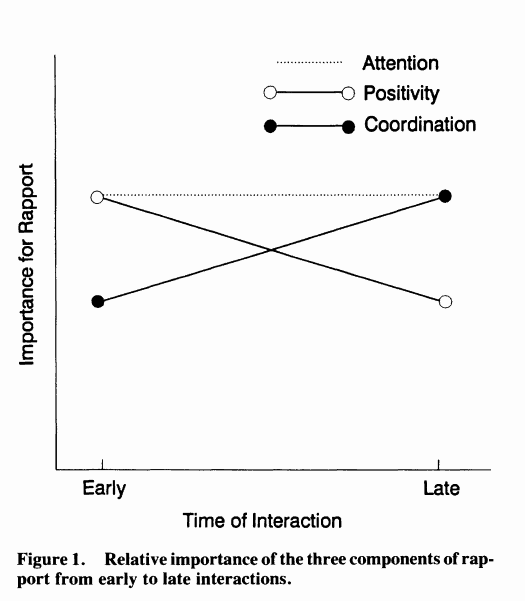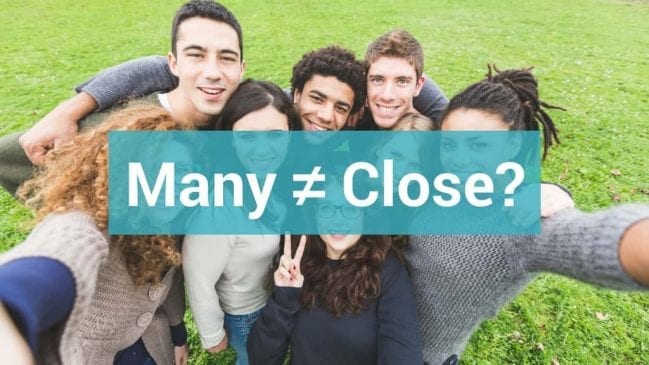A few years ago I was at a conference in London. There was this one guy there who seemed to know EVERYONE.
He seemed to have nothing holding him back socially. The best way to sum this guy up is something he once said: “It takes a too long time to walk through town because people I know come up to me all the time.”
This would earn him the title of “social genius”, right?
Well, here’s the problem: I happen to know that he has almost no real friends.
Apparently, there’s a difference between the ability to make lots of friends and making close friends.
In a study, researchers were able to scientifically pinpoint that exact difference – and we can use their findings to figure out which ability we want to improve.
To make people like you from the very first moment, the scientists found, these are the two most important abilities:
- You show interest in the other person and focus on them (Attention)
- You show friendliness and warmth towards the other person (Positivity)
Our social guy had these two abilities. He’s the most approachable person you’ll ever meet.
To make long-term friends, however, something changes.
- You still need to be a good listener. Attention is always important.
- Positivity doesn’t matter as much anymore. When we meet someone for the first time, we’re expected to smile and exchange pleasantries. Without old friends, a “what’s up” is OK. Instead, a new ability has become the most important once the relationship is established: It’s called “coordination”.

Graph from the study (reference at bottom of post)
Coordination is the ability to “tune in” to the other person, to get on the same wavelength. When you coordinate well with someone, you both feel like you understand each other and your conversation will feel like the most natural thing in the world. It can be anything from the pitch of your voice, and your posture, to your ability to have balanced “give-and-take”-conversations, and understanding and sticking to the expected topics.
Here are some examples of bad and good coordination.
Bad vs Good examples of coordination:
- “Taking over” the conversation and forgetting to listen to the other person
- Being as interested in listening to what the other person has to say as talking
- Talking louder or softer than the other person
- Paying attention to how the other person is talking and adjusting your voice to what suits the situation
- Being overly formal and TOO polite towards a friend
- Being your normal, relaxed self with your friend
- Using words the other person might not understand (perhaps in an attempt to impress) or using profanity when the other person isn’t
- Listening in on what language suits the situation
- Interrupting because you feel like you have so said something
- Letting someone finish what they are saying first
Our social guy lacked coordination. He was entertaining to listen to, but after a while, people got annoyed by how he took up all the space in the group. Going from a minor annoyance, over time it became too much for everyone.
What the model says is the following:
There are people who are positive towards others but don’t coordinate well. These people can develop a lot of friendships, but these friendships are often superficial.
Then there are people who aren’t good at showing positivity (liking, friendliness, warmth), but who coordinate well. These people have a harder time making new friends – but the friends they DO make, they develop deep relationships with.
And following that logic, if you both show that you like people AND coordinate with them, you’ll be able to develop deep relationships with a lot of people (if you want to).
Meeting the guy at that conference taught me one thing: There’s a day-and-night difference between being very social and being very socially skilled.

Here I was, with accidental Trump hair and double collar, at Spotify’s conference in London.
This model also teaches us something interesting about awkwardness
Here’s an interesting excerpt from the study:
“Participants in later interactions, however, would judge the level of rapport more from the degree of coordination they felt. They would expect the interaction to feel less awkward-more smoothly run-and to involve fewer communication misjudgments. Early on, smooth coordination would be not expected as much,”
This means that early on in interactions, we don’t expect everything to flow perfectly and feel totally natural. We tend to be more forgiving when it comes to initial awkwardness (lower coordination) because that’s just part of any early interaction.
What we SHOULD be afraid of is to not show that we like the one we’re talking to. We want to be approachable, warm and don’t be afraid to give compliments if it feels natural (This isn’t the same as being needy). Ironically, it’s this positivity that we forget to show when we’re too occupied with avoiding awkwardness.









Well how do you work on coordination? I seem to have a harder time with it, too.
Coordination is probably the most complex principle, so I understand how it may seem unclear. I think one of the first major things to work on with coordination, that gives a big effect is to learn to adapt your social energy level to the other person. We’ve written more about it here: https://socialself.com/blog/social-energy/
Then you can also check the list we made in this article with examples to see other things you can work on. Hope that helps!